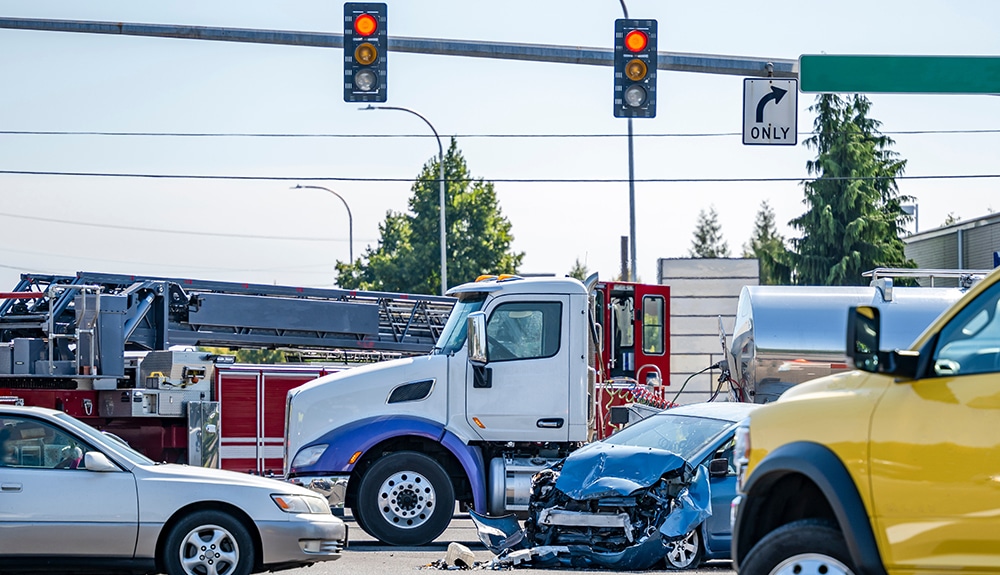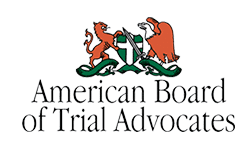How Could Multiple Parties Be at Fault for a Truck Accident?

A collision with a large truck is a life-altering experience. A fully loaded tractor-trailer unit can weigh as much as 80,000 pounds and around 35,000 pounds when empty. The average midsize motor vehicle only weighs 3,300 pounds, making your car no match for a commercial truck.
Injuries associated with truck accidents are severe. At Pittman Roberts & Welsh, PLLC, we often work with victims suffering from traumatic brain injuries (TBIs), spinal cord injuries, and dislocated spinal discs. We are proud of the service and compassion that our lawyers provide to clients, especially since we often meet them as they are going through some of the most difficult periods of their lives.
We work tirelessly for our clients, securing compensation for things like medical bills, lost wages, pain and suffering, emotional trauma, and more. To do this, we must first establish who was at fault for the accident. Our attorneys know that there is often more than one party at fault for a truck accident. Here’s who might be at fault in your own trucking accident.
Truck Drivers
The truck driver is usually an obvious at-fault party. Whether you were cut off by a truck driver or rear-ended when they were following too close, a negligent truck driver could be at fault. It is not enough to simply claim that the truck driver caused the accident, though. The trucker’s employer will have the insurance company on their side, and most insurers are not eager to pay out claims.
At Pittman Roberts & Welsh, PLLC, we will gather evidence that can help prove whether the driver was acting negligently or recklessly at the time of the accident. This includes things like:
- Whether the driver was violating hours-of-service (HOS) regulations
- Any evidence of intoxication or drug use
- Distractions, including texting, making phone calls, or scrolling through social media
- Drowsy or fatigued driving
An attorney can also request a truck driver’s employment records. Information contained within these records might help paint a better picture of what kind of driver they are. If there is evidence of previous moving violations, accidents, or reckless driving, it might help prove that the driver has displayed a pattern of disregard for safe driving habits.
Truck Companies
Trucking companies can also be held at fault in an accident. This can be confusing to some people, and understandably so. When accident lawyers discuss assigning fault in an accident, the conversation often centers around the drivers. Specifically, which driver’s actions led to a given accident?
We know that at-fault parties are not always present for the actual crash. A trucking company may be at fault for an accident if they:
- Encouraged or even required HOS violations among their drivers
- Failed to perform regular maintenance
- Failed to perform necessary repairs
- Did not run a background check on a new hire
If a trucking company takes any action (or inaction) that allows a dangerous driver or truck to go on the road, they could be at fault for a subsequent truck accident.
Other Drivers
There are also times when it is appropriate to assign fault for a truck accident to other motorists. For example, if you were driving on the interstate and another car cut off a tractor-trailer, causing the truck driver to swerve to avoid a rear-end collision only to strike you in the process, that other driver could be at fault.
Truck accidents can happen in the blink of an eye, and it can be hard to determine exactly how other drivers might have played a role. It can be especially difficult if the other driver’s vehicle was untouched and they quickly left the scene of the accident. Even if the other driver was involved and suffered auto damages or injuries, they may try to pin the blame on you.
Your attorney should help you piece together the details of what actually happened, which may include:
- Taking witness statements
- Looking at dashcam footage
- Working with an expert to reconstruct the accident scene
Do not take the fall for an accident that was not your fault. Accepting full responsibility will severely limit your chances of securing compensation for your damages, including medical bills and lost wages.
Comparative Negligence
At Pittman Roberts & Welsh, PLLC, we frequently work with clients who are worried that being partially at fault will make it impossible to file a personal injury claim. This is not the case. Mississippi uses a modified comparative fault system, which allows accident victims to pursue compensation even if they are partially at fault.
You should, however, expect to see a reduction in how much compensation you are entitled to. According to Mississippi Code § 11-7-15, compensation for damages will be reduced by the same percentage of your fault in the accident. So, if you were 10% at fault for a truck accident, your overall compensation would be reduced by 10%.
The truck driver, trucking company, and any other involved drivers will likely be trying to avoid accepting fault in your accident, though. They may argue that you were more at fault than you actually were, or even that the entire accident was wholly your responsibility and no one else’s. For every additional percentage of fault you are assigned in an accident, the less compensation you will receive for your damages. Do not allow others to unfairly place the blame on your shoulders.
Determining Fault for Your Truck Accident
It takes the right experience, knowledge, and grit to go up against the trucking company and its insurer. Even if you were clearly not at fault, the insurance company may try to push or bully you into accepting a settlement that does not fully cover your medical bills, lost wages, diminished earning potential, and more.
Pittman Roberts & Welsh, PLLC refuses to let the insurance company push our clients around. Whether working to establish fault or accurately valuing your claim, we work for the best possible outcome for your situation.
There is no need to delay. Contact us to schedule your free consultation with one of our lawyers.







